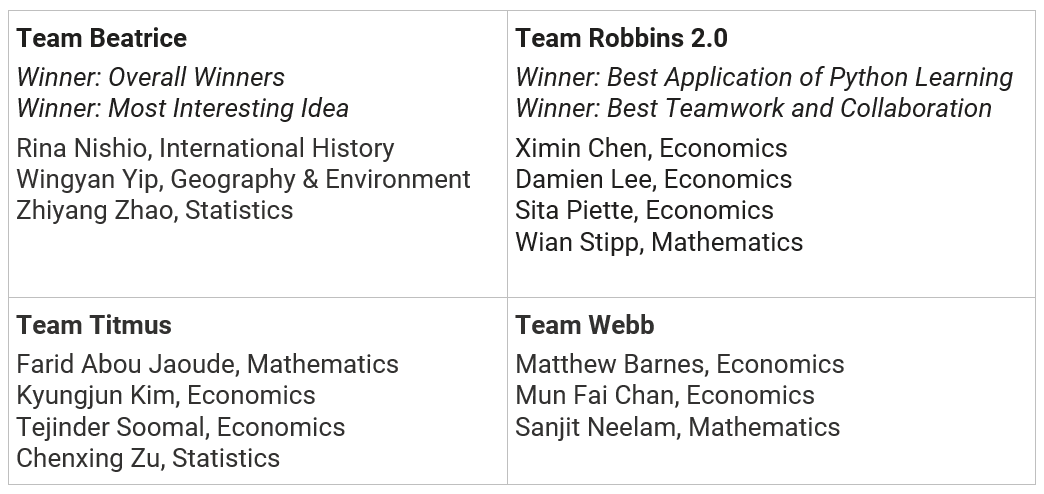We would like to congratulate the winners and participants of our inaugural Python Coding Challenge organised by the Digital Skills Lab in partnership with LSE Careers, the Department of Economics, and Infosys, a global leader in next-generation digital services and consulting.
Students completed an online Python course before being sorted into teams and challenged to apply their coding skills to a real-world problem centred around financial analysis. Due to the disruption of the Covid-19 outbreak, the challenge had to be adapted to an online format at the last minute. Despite the disruption, four of the original nine teams completed their projects and submitted a final recorded presentation to compete for the four prizes.

We would like to thank Dr Antonio Mele, Associate Professorial Lecturer in Economics at LSE, who set the challenge that asked the question 'Why did the US dollar appreciate during the financial crisis?'. Thanks also to Dr Srinivasa Raghavan, Chief Data Scientist, Data and Analytics at Infosys, who joined the judging panel to review the submissions and presented the awards to the winning teams during an online celebration. All student participants were able to show how they effectively applied and extended coding skills to this real-world problem, interweaving it with their own academic research on the topic set, and presenting their ideas clearly and effectively.
We would also like extend special thanks to Aaron Trevitt from LSE Careers, who worked with us on developing the teamwork and employability aspect of the challenge. After the awards ceremony one team member commented: “For future interviews, we'll have the 'time as you worked as a team under difficult circumstances' question nailed!” demonstrating one of the ways the challenge contributed to student employability.
The overall winners, and winners of the most interesting idea prize, were Team Beatrice, consisting of Masters students from Geography, Stats, and International History. LSE staff and students can view their presentation here.
The winners of the Best application of Python learning and of Best teamwork and collaboration were Team Robbins 2.0, which was a group of Economics and Maths undergraduates, made up of members of other disbanded groups. Despite only coming together 10 days before the deadline, they produced outstanding work. You can view their presentation here.
I am an international history student who is a complete stranger to data science or coding. I started this challenge with a mere curiosity, but now I can say with a confidence that the challenge was one of the most fruitful experiences I have gained from LSE.
Besides having been able to obtain python skills from scratch, I was given a chance to develop my team working skills. Moreover, I could learn how to apply the coding skills to solve actual social problems through the challenge, which is rather difficult to grasp when you are just studying technical skills of python.
I would like to recommend this coding challenge for those who would like to learn coding but do not know how to do it by your own and who have learnt it a bit but have no idea on how you can apply the learned skills.
--Rina Nishio, MSc theory and History of International Relations
We would also like to thank the Asia Careers Society who initiated the request that inspired the coding challenge. If you have an idea for another coding challenge you would like us to help develop, please do get in touch by emailing us at digital.skills.lab@lse.ac.uk. Make sure to check out the Python Coding Challenge: Lent Term 2021.